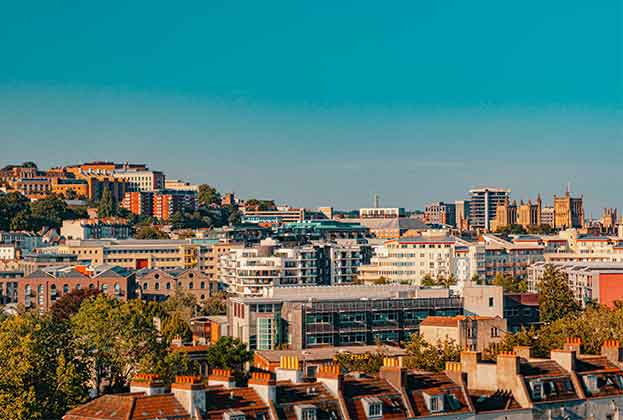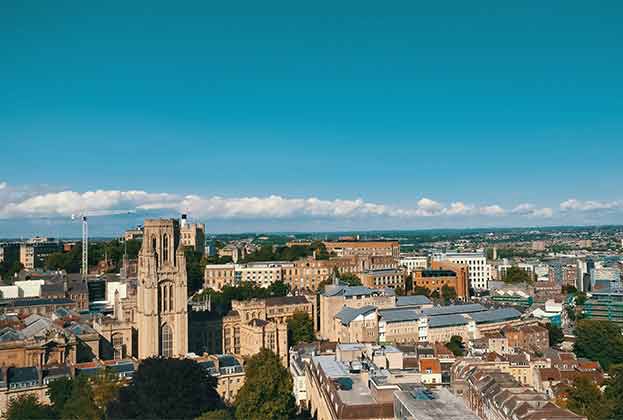Demand for office space in Bristol city centre remains strong, but the changing needs of occupiers needs to be addressed
Demand for high-quality regional offices has grown significantly over the last decade. With offices now being used as a recruitment tool and a key feature in the race for talent, occupiers are willing to pay premium rents for the best space.
Bristol’s office market has consistently seen some of the highest rents of the ‘big six’ regional office markets, with 32% rental growth on the best space over the past five years. High-quality stock and businesses relocating from London have driven growth from the demand side. Limited availability, exacerbated by permitted development rights eroding the city’s secondary stock, has added pressure from the supply side.
As occupiers consider relocating to cheaper locations outside London, regional cities have had to improve the quality of workspace on offer. Bristol remains ahead of the curve, having the second highest BREEAM rated office building outside London. Aurora in Finzels Reach achieved a 91% BREEAM score and a Gold LEED rating.
.jpg)
Offices don’t just need to minimise harm to the environment, they need to protect their occupants as well. Health and wellbeing have become more prominent following the experience of Covid-19. Workplaces that provide better air quality, access to outdoor space, and facilities to encourage running or cycling to work will look increasingly attractive to occupiers. Building on these trends, Bristol’s Grade A office buildings now offer a similar specification to the best new blocks in the City of London.
Take London’s 280 Bishopsgate, for instance: designed with health and wellbeing in mind, the building offers a communal roof garden and terraces on every floor so workers have access to outdoor space. Cycle-in entry means staff don’t need to wrangle their bikes up and down stairs or through heavy doors to get to work. And a wellness suite lets employees blow off some steam on their lunch break or before they head home for the day.
While Bristol cannot compete with the sheer scale of space available at Bishopsgate (265,000 sq ft), three new schemes mean it can compete on specification: Assembly, Halo, and EQ.
Assembly, built in 2020 and fully let to BT during its construction (Q4 2019), has taken on many features associated with a top Grade A London office building. The building has external terraces, which can be used as breakout areas, as well as green rooftop spaces. These features make the most of the waterside location and provide panoramic views of Bristol’s city centre. The building also has shower and changing room facilities and bike storage and hire. The difference is stark when compared to Grade A Bristol offices built ten years ago, which focused on floorplate size, high-quality finishes and car parking without any of the well-being focused extras they have today.
Bristol’s offices will need to keep adapting to keep up with occupiers’ high standards and the continued flight to quality. Covid-19 has only accelerated the need to change. Currently, many occupiers will be assessing whether or not their current office meets their workforce’s shifting priorities.
The Savills Office FiT survey showed that while there is no doubt the office will remain a necessity, the way we use these spaces will have to change. High-density, open-plan workspaces will need to be rethought and reconfigured to allow for agile working, while amenities remain as important as ever for the workforce. While it’s easy enough to buckle down on a report from a laptop at the kitchen table, cooperative work and networking are far easier in an office environment. Future office designs will have to accommodate these collaborative activities.
Returning to the office, many occupiers may find that they now have a shortage of insulated space where people can take calls, as online meetings have become the norm. Landlords should therefore look to solutions to facilitate this, increasing the number of personal quiet spaces where staff can hold virtual meetings and calls.
Demand for office space in Bristol city centre remains strong, despite the pandemic disruption. As recently as Q3, long-time out-of-town occupier Gleeds leased 7,000 sq ft of Grade A space in Aurora, setting the current headline rent of £37.50. The way occupiers use those city centre spaces is set to change, however. Providers will need to consider these shifting priorities if they are to continue attracting the best rents.
View all of our latest Bristol Cross Sector research here.
Read the articles within Spotlight: Building for Bristol below.
.jpg)



